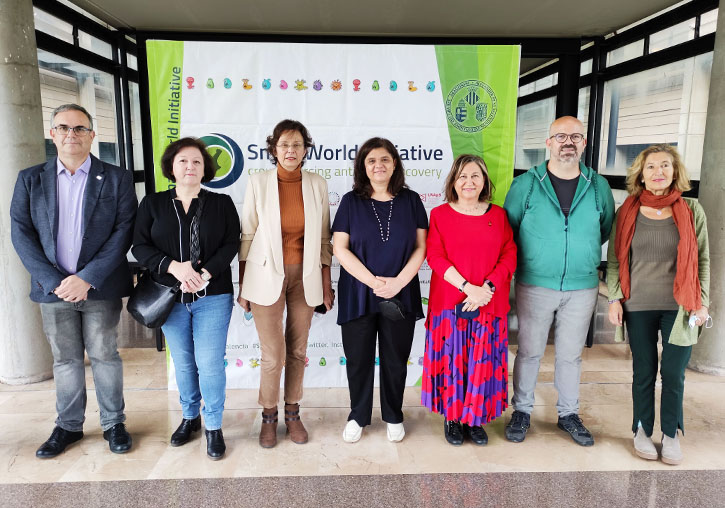The University closes the Micromón-Tiny Earth-Small World Initiative, a biomedical dissemination project for secondary school students
- Scientific Culture and Innovation Unit
- May 5th, 2022

The Charles Darwin Room of the Burjassot-Paterna Campus hosted this Thursday 5th from 9:30 a.m. the closing ceremony of the Micromón-University of Valencia (UV) project, developed in sixteen countries and which aims to bring scientific culture and biomedical research closer to pre-university educational levels and encourage research vocation. At the academic institution, the proposal is coordinated by teachers from the Department of Microbiology and Ecology, led by Sergi Maicas.
In the first phase, at the end of June 2021, 13 secondary school teachers began their own training program in collaboration with the CEFIRE-CTEM (Valencian Government). In a second phase, during the month of November, 48 students from the Faculties of Biology and Pharmacy underwent specific training on the programme. During the months of February-March of this year, the university students and their teachers (from the Department of Microbiology and Ecology) travelled to thirteen Valencian secondary and primary schools where they guided the performance of experiments that aim to discover new antibiotic-producing bacterial strains.
Participating in this Thursday’s event was J. Javier Navarro, director of the UV’s Lifelong Learning and Educational Innovation Service; Hortensia Rico, dean of the Faculty of Pharmacy; Sergi Maicas, coordinator of Micromón UV; Helena Rausell, vice-rector for Equality, Diversity and Inclusive Policies of the academic institution; Belén Fouz, co-coordinator of Micromón 21/22; Carmen Bañó, Dean of the Faculty of Biological Sciences; and Elena Thibaut, director of the CEFIRE CTEM (Valencian Government).
Small World Initiative is an international scientific project that emerged from Yale University (USA) in 2012 as a strategy to promote a vocation for scientific research among young people and deals with a pressing health problem such as the need to find new antibiotics effective against infectious diseases. The World Health Organization (WHO) has warned about this problem and has promoted since 2015 the world week of awareness about the use of antibiotics, which is celebrated every November.
The success in its country of origin led the project to expand in the following years to numerous countries, including Spain, where it began to be developed in 2017 through the Micromundo@Spain network, made up of 30 universities, and of which the University of Valencia is co-founder.
During the project, in each of the secondary schools, groups formed by 4-5 university students or MITAS (MIcromón Training Assistant) and a teacher or MIPI (MIcromón Partner Instructor) held five sessions in collaboration with their teachers, in which secondary school students learned about the problem of bacterial resistance to antibiotics and its socioeconomic impact, and assimilated various experimental methodologies.
The Micromón@University of Valencia project involves, in each of its editions, around 500 people/year, including MITAS, MITAS SENIOR, MIPIS, secondary school students and teachers. In the 2021/22 academic year, new centres have been incorporated into the project: IES Veles e Vents (Torrent), IES Didín Puig (Guadassuar), IES Massamagrell, IES Escultor Francesc Badia (Foios), IES Tierno Galván (Montcada), IES Guillem d’Alcalà (La Pobla de Farnals), IES Nou Derramador (Ibi) and IES Francesc Ribalta (Castelló de Plana), who have joined others who have already participated in previous editions. The Micromón@University of Valencia network currently integrates 40 educational centres in the Valencian Community.
The Micromón@University of Valencia project is a member of international (Small World Initiative, Tiny Earth) and Spanish-Portuguese (MicroMundo) consortiums. It is a project co-funded by the Lifelong Learning and Educational Innovation Service, the Equality Unit, the Language and Linguistic Policy Service of the University of Valencia and whose dissemination is in charge of the Scientific Culture and Innovation Unit. In addition, it is endorsed by the Spanish Society of Microbiology and the National Antibiotic Resistance Plan (Ministry of Health, Social Services and Equality).
















